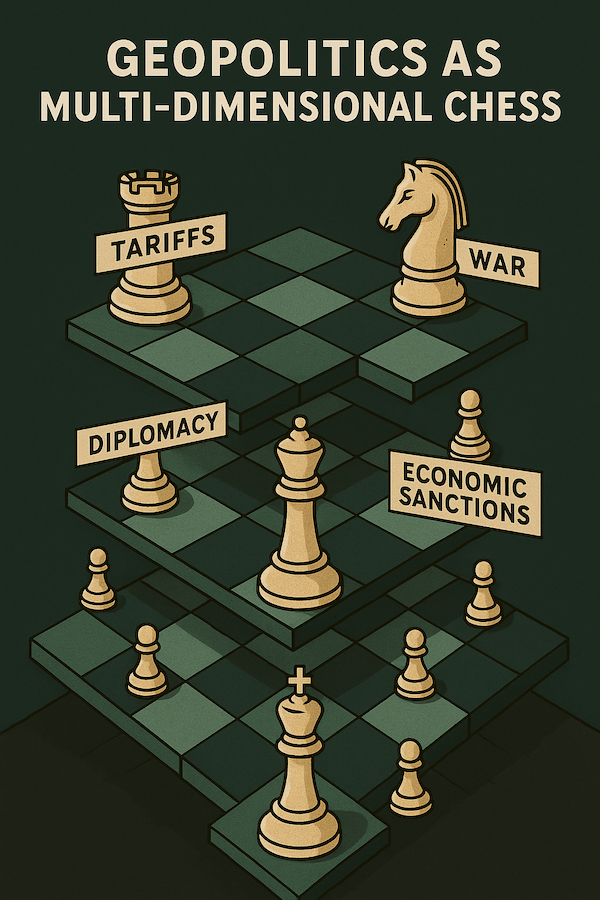Looking at Geo-politics as Chess
Geo-politics and Chess have lot of similarities. Both domains are strategic, involve asymmetric power dynamics, and depend heavily on positioning, foresight, and timing.
Lets expand this analogy further, just for fun.

🏰 Rook – Trade & Tariffs
- Straight-line power, long reach.
- Tariffs, trade agreements, sanctions, and financial regulations are like rooks. They move in straight, forceful lines—direct and impactful, especially over long distances.
- Countries like the U.S. or China wield rooks when they impose sanctions (e.g., U.S. on Iran/Russia) or control supply chains (e.g., rare earth metals, semiconductors).
- Example: EU’s GDPR laws as “trade rooks” that influence global data practices.
♞ Knight – Covert Operations & Intelligence
- Unpredictable, jumps over obstacles.
- Knights represent intelligence agencies (CIA, MI6, Mossad), cyber warfare units, or proxy operations. They don’t move in straight lines, often catching adversaries off guard.
- Their power lies in asymmetric action—sabotage, regime destabilization, or intelligence leaks.
- Example: Russia’s hybrid warfare strategies (e.g., disinformation + cyberattacks).
♝ Bishop – Diplomacy & Alliances
- Diagonal movement, subtle and nuanced.
- Bishops are diplomats, embassies, and international coalitions (UN, NATO, ASEAN). They maneuver through ideological and cultural angles rather than brute force.
- Like bishops, these actors rely on long-term influence, spreading values, and leveraging soft power.
- Example: France’s cultural diplomacy in Africa or China’s Confucius Institutes.
♛ Queen – Military Power
- Most versatile and powerful.
- The queen is the full-scale military—aircraft carriers, nukes, full-spectrum dominance. It can threaten any part of the board and change the game rapidly.
- Only a few countries have “queens” that can act globally: the U.S., Russia, China to some extent.
- Example: U.S. interventions in the Middle East or NATO’s rapid deployment forces.
♚ King – National Sovereignty & Survival
- Must be protected at all costs.
- The king represents the state’s core: national sovereignty, regime stability, or leadership survival. The whole game is about protecting this piece.
- If a state’s sovereignty is compromised (e.g., Ukraine, Taiwan), it’s check or checkmate.
- Example: North Korea’s entire strategy revolves around regime survival—the king.
♙ Pawns – Public Opinion, Proxy States, Developing Nations
- Numerous, expendable, but game-changing.
- Pawns represent citizens (public opinion), smaller states, or proxies used by bigger powers. They may seem weak individually, but when mobilized (uprisings, nationalism, demography), they can transform the board.
- Some pawns can be “promoted”—developing countries becoming regional powers (e.g., India, Brazil).
- Example: Arab Spring as a wave of pawn uprisings disrupting the board.
🧩 Other Chess Concepts Mapped to Geopolitics:
| Chess Concept | Geopolitical Analogy |
|---|---|
| Castling | Defensive alliances or internal reforms to stabilize leadership (e.g., political reshuffling). |
| En passant | Exploiting transitional vulnerabilities (e.g., attacking during elections or crises). |
| Check | Diplomatic/military pressure (e.g., naval exercises near contested waters). |
| Checkmate | Regime collapse, occupation, or complete isolation (e.g., Saddam in 2003). |
| Opening Strategy | Foreign policy doctrine (e.g., Monroe Doctrine, Belt and Road). |
| Endgame | Declining empires focusing on preservation (e.g., Russia clinging to influence in near-abroad). |
Geopolitics today isn’t a clean 1v1 game like classic chess; it’s more like a multi-board, multi-player, 4D game where alliances shift, rules get rewritten mid-game, and some players sit out rounds but influence the outcome anyway.